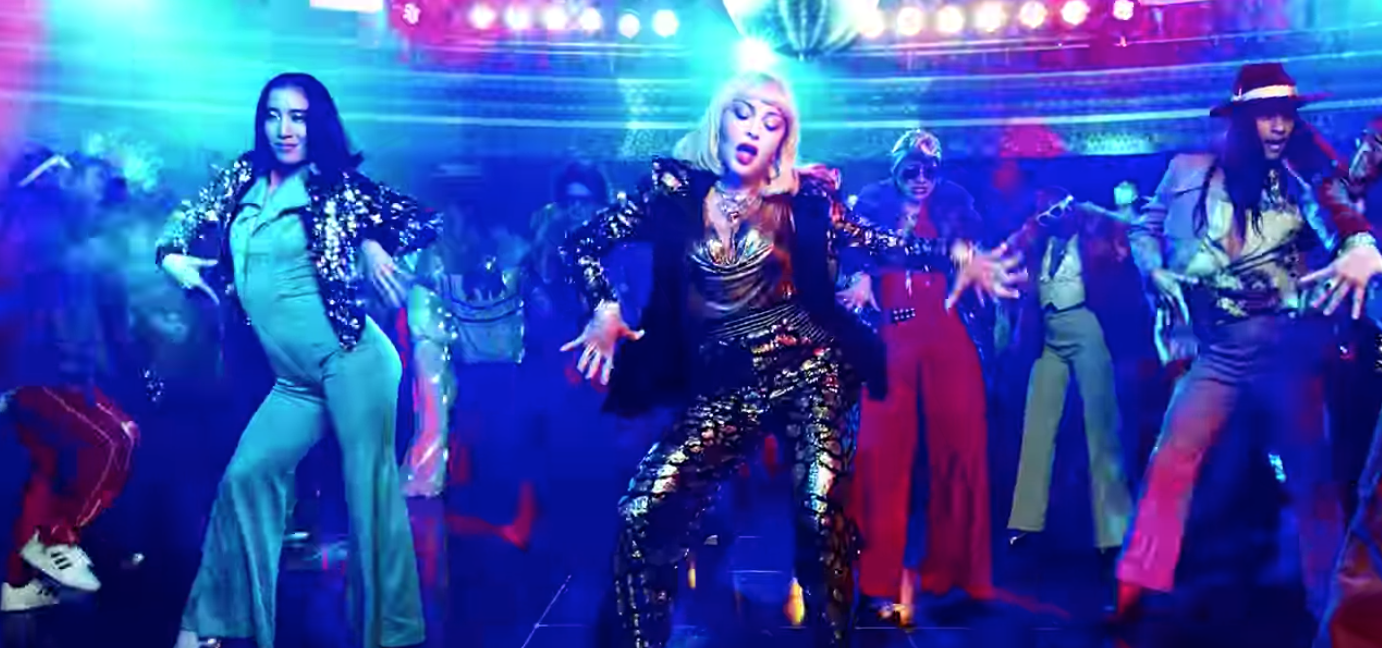As Madonna has likened her time in Lisbon to the early years of her New York days, when she had first moved there and knew no one, it is fitting that she should return, once again, to the city as she knew it in the 70s (though she does return to it in the present as well in the video for “Crave“). The version of it that didn’t even bother with sheep’s clothing to harden her heart quite quickly (a scene in the video alluding strongly to the rape she could talk about only decades later).
Yet despite its non-fuzzy corporate feelings to those who came into its fold back then, no one could deny the aura of electricity emanating from its still semi-present soul. The soul that spat out Studio 54 and Danceteria. It is more the former that Madonna pays homage to, considering “God Control” is rife with Mirwais-sanctioned disco beats in between a choir ominously chanting, “We lost God control” (intended to sound like “gun control” as well, and to infer perhaps that man plays god in his arbitrary decision to take lives). But before realizing just how out of control things have gotten, Madonna and her crew take to the dance floor to attempt to sweat out their pain and fears (after all, Madame X has been banging on a typewriter all night as she describes the injustices of the world through her lyrics). This as the dark-haired Madonna reflects on it all while the clock rewinds from three a.m. and back into the ten o’ clock hour (for Åkerlund loves his time manipulations when it comes to Madonna videos–ahem, “Ray of Light”), when it was all still so untainted by bloodshed. Naturally committed by a white male wearing Mark David Chapman glasses.
Channeling both “Deeper and Deeper” and “Music” (also directed by Åkerlund) vibes in terms of 70s nightclub aesthetic, a blond Madonna initially feels empowered upon entering the space, The Globe (which happens to be in L.A., not New York, and features a marquee on it that reads: “WE NEED TO WAKE UP,” as also declared by the vocals), ready to dance her cares away just as everyone else is (though, of course, she’s sure to assert that she doesn’t smoke dope, adding another layer of more ironic political consciousness to the song). As an overt reference to the Pulse nightclub shooting that took place in Orlando in 2016, Madonna touches on the two things that have always been closest to her heart: gay men and the erstwhile freedom of the dance floor.
And as she leaves The Globe masquerading as the many clubs of her downtown New York days, she is confronted in an alleyway by two thugs who hold her at gunpoint. They escape with some cash as Madonna screams, “Get your fuckin’ hands off of me!” It’s a tense and dramatic scene that speaks of other impending portents, the dance moves as abrupt and inexplicable as the gunshots themselves. But back at 9:50 p.m., when the night was still so filled with promise (even though Madonna gets ready with a “Straight White Men Rule Everything Around Me” poster in the background), Madonna tucks the money that’s ultimately snatched from her bra into her tit with good faith. Even as she sees yet another news report about a shooting as she hops out onto her fire escape to leave.
At the end, the dark-haired Madonna who has fiendishly been typing beneath her idols, Simone de Beauvoir, Frida Kahlo and Angela Davis, stops to stare simply at the camera and shed a tear. A title card then appears espousing the Davis quote: “I am no longer accepting the things I cannot change. I am changing the things I cannot accept.” Just as those who have been in New York for too long can’t accept that it’s over.
So it is that Madonna imbues the nostalgia once present in the likes of “Deeper and Deeper” with a dark and serious tinge (there will be no more light-hearted eating of bananas while watching a half-dressed man in her apartment). No longer is the dance floor colored with positive vibes and a sense of hope, but a potential source of danger. It is not the glittering yet gritty New York of her past, nor will it ever be again. That much is subtly made clear by commencing the video with a shot of the post-Empire silhouette of the World Trade Center as opposed to its better and more iconic 70s outline. We can pretend to retreat into the safety of the past (despite everything being technically much more perilous back then), but it will never be the same. Nor will the once great artistic haven of New York, now made more realistic on an L.A. set.




















